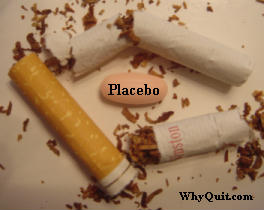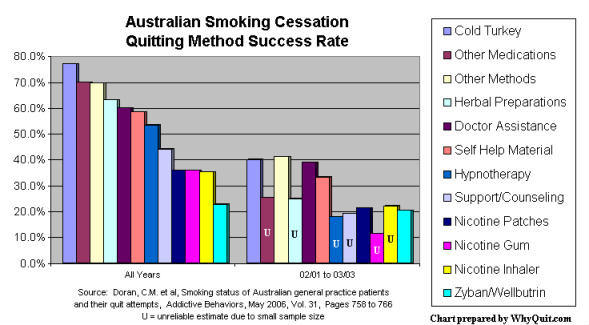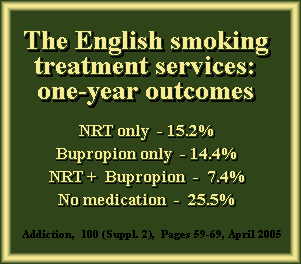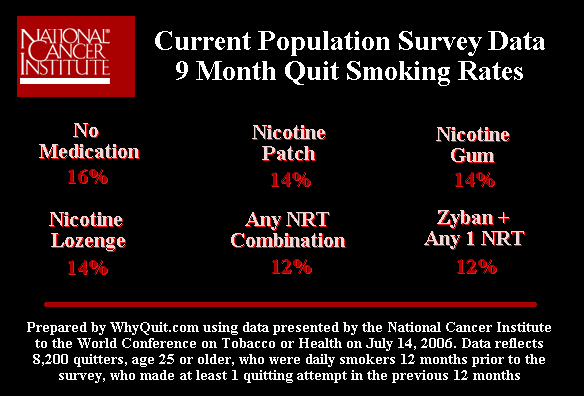
Flawed research equates placebo to cold turkey
Is government backing of pharmaceutical industry deceit killing smokers?
John R. Polito March 12, 2007
 GlaxoSmithKline (GSK), maker of Nicorette nicotine gum, issued a 2006 press release entitled "Survey findings show African Americans try to quit smoking cold turkey over any other method which explains low success rates." In it, GSK announces that it will be sponsering "Don't Go Cold Turkey Day" in November, while quotting a physician as saying that using nicotine replacement therapy "doubles one's chances of quitting."
GlaxoSmithKline (GSK), maker of Nicorette nicotine gum, issued a 2006 press release entitled "Survey findings show African Americans try to quit smoking cold turkey over any other method which explains low success rates." In it, GSK announces that it will be sponsering "Don't Go Cold Turkey Day" in November, while quotting a physician as saying that using nicotine replacement therapy "doubles one's chances of quitting."
A 2004 Pfizer press releasee entitled "Cold Turkey is for Leftovers" claimed that "smokers who seek therapeutic assistance while quitting smoking can double their chances of success."
Doubled chances compared to what? Those headlines and countless other industry representations imply a comparison to real-world cold turkey quitters.
Across the airways and Internet, the industry creates the impression that, in direct competition with people who choose cold turkey, users of its products have blown them out of the water. In fact, industry claims are based on artificial laboratory studies. They are valid only to the extent that laboratory conditions are like real life.
Therefore, we need to consider: can people who volunteer to test a drug, but who are randomly assigned to get a placebo instead of the drug they wanted, reasonably be compared to people who decide to quit smoking without drugs?
A growing chorus of independent experts and health advocates are expressing concern that the pharmaceutical industry has either divorced itself from common sense or is intentionally deceiving smokers.
"Pharmacotherapy in general is over-emphasized," asserts Dr. Michael Siegel, a physician and professor at Boston University School of Public Health. "Most smokers who quit successfully long-term are those who quit cold turkey without any particular pharmaceutical aids."
"Research efforts trying to show that NRT does work, however marginally, had to concentrate primarily on short term results, since long range cessation successes have been weak, unconvincing or altogether absent," contends Dr. K.H. Ginzel, a physician, retired University of Arkansas pharmacology professor and life-long nicotine researcher.
"The magical pill or patch to make you a nonsmoker is no match for the nonchemical behavioral and psychotherapeutic treatments of nicotine addiction, not to speak of the good old-fashioned 'Cold Turkey' approach."
The industry is fully aware that randomized clinical trials did not involve cold turkey quitters. Instead, pharmacology clinical trials compared those who hoped to obtain some degree of anxiety relief from the free dopamine enhancement chemical being offered in the study (nicotine, bupropion or varenicline) to those who wanted such a drug but didn't get it.
While the study subjects hoped for some chemical relief of anxiety and other withdrawal symptoms, cold turkey quitter expectations are very different. They fully expect to endure the anxieties associated with up to three days of nicotine detox. They expect to navigate full-blown withdrawal, not minimize, drag it out, or postpone it. They would have no motive to sign up for clinical trials.
Concerns do not end with selection of subjects. A hallmark of the classical "blind" clinical trial is that subjects and researchers do not know who is getting the medicine and who is getting the placebo. If the study is not truly blind, it is impossible to know whether any apparent benefits come from the chemical itself or from the belief that the chemical is working.
A good clinical trial will evaluate its own blindness - ask subjects to guess whether they are getting the active drug or the placebo. If the study is blind, about the same number should guess right as guess wrong.
Such blindness studies as we have (Mooney 2005) tell us that NRT clinical studies were generally not blind as claimed. Nicotine withdrawal causes a host of well documented symptoms, including substantial anxiety, anger, irritability, impatience, restlessness, time distortion, chest tightness, headaches, an inability to concentrate, a sense of mind fog, fatigue and insomnia.
Most study subjects have attempted to quit in the past and would naturally recognize their own withdrawal symptoms. Having jumped through a number of hoops for the promise of free "medication," placebo recipients would add frustration to the list of symptoms that prior failed attempts had taught them to expect. It's hardly surprising that this group, being treated this way, would fail to quit smoking. Those much touted "doubled odds" were not earned in the clinical trials, but secured by default.
"The failure of blinding in just about every NRT clinical trial casts doubt on the validity of these studies," suggests Dr. Siegel. "Smokers entering a trial and hoping to receive nicotine replacement are likely to be able to detect whether they are indeed receiving it. And if they aren't, what are the chances that they are going to maintain their enthusiasm and motivation to remain cigarette-free?"
"The issue of possible failure of blinding, and hence of possible bias in estimates of treatment effect is a potential problem in many areas of medicine," asserts Lindsay Stead, author of Cochrane Group articles supporting NRT.
But given that a study's blindness goes to its core validity and the whole reason for testing against placebos in the first place, this response is hardly acceptable. If the problem is inherent in the study's design, it's time to revise the design.
Dr. Siegel asks, "Is NRT truly being compared to placebo, or is this essentially a one-arm study, with NRT being compared to a population of disappointed research subjects?"
The only way to have honest comparisons is to invite and fairly service the nicotine dependency recovery needs of those having an expectation of abruptly ending all nicotine use. To experience the current study format farce in all its glory we'd need to actively recruit smokers who want to quit cold turkey and then randomly assign half to wear a patch. If that sounds strange, remember it is just the mirror image of the clinical trials done to date.
Real-World Effectiveness Surveys
Although those assigned to the active group and actually receiving these drugs in clinical trials achieved success rates 1.5 to 2 times higher than those assigned to placebo, once outside the clinic doors and going head-to-head against real cold turkey quitters, NRT and bupropion fell flat on their face.
In a February 8, 2007 Wall Street Journal (WSJ) article by Pulitzer Prize winning journalist Kevin Helliker he writes, "Some public-health officials say industry-funded doctors are ignoring other studies that suggest cold turkey is just as effective or even superior to nicotine patches and other pharmaceuticals over the long run, not to mention cheaper."
Surveys from California (2002), Minnesota (2002), Quebec (2004), London (2003), Maryland (2005), UK NHS (2006) and Australia (2006) all report no long-term statistical advantage for quitters using pharmaceutical quitting aids over cold turkey quitters. In fact, in the Australian study, among patients of 1,000 family practice physicians, cold turkey was twice as effective as NRT or bupropion (Zyban/Wellbutrin).

"To imply that medications are the only way is inappropriate," says Lois Biener, a senior research fellow at the University of Massachusetts at Boston who has surveyed former smokers in her state, as quoted by Helliker. "Most people don't want them. Most of the people who do quit successfully do so without them."
A growing body of real-world effectiveness evidence screams that quitting medications are a sham. Yet, political appointee health policymakers at the AHRQ, CDC, FDA, FTC and NIH, appointed by an administration that has made no secret about placing pharmaceutical industry profits above consumer concerns, continue to turn their heads.
 "If we're going to be intellectually honest, we have to be willing to examine the issue of whether current users [of medication] are obtaining long-term rates of abstinence that are higher than anyone else," Helliker quotes Kenneth Warner, a tobacco researcher and dean of the University of Michigan School of Public Health as saying. "That's going to be very hard for people to do in the smoking-cessation community, because belief in the value of medication runs so deep."
"If we're going to be intellectually honest, we have to be willing to examine the issue of whether current users [of medication] are obtaining long-term rates of abstinence that are higher than anyone else," Helliker quotes Kenneth Warner, a tobacco researcher and dean of the University of Michigan School of Public Health as saying. "That's going to be very hard for people to do in the smoking-cessation community, because belief in the value of medication runs so deep."
Those beliefs are so profound that in one instance NRT advocates resorted to impliedly suggesting that "real-world" New York quitters receiving free NRT went head-to-head with non-NRT quitters and prevailed. A 2006 study documents a give-a-way of free NRT and contrasts quitting rates "with the quit rate computed from an earlier follow-up survey of Quitline callers who were not provided NRT."
What isn't mentioned is that the earlier Quitline data was from a program strongly advocating "purchase" and use of NRT, or that the give-a-way, more than a year later, occurred in conjunction with a highly motivating event - New York going smokeless.
"There is really no good evidence that nicotine replacement therapy in the long run makes a big difference," says Dr. Ginzel.
The first quitting method survey review bold enough to openly declare that NRT is ineffective as an aid to smoking cessation was authored by John P. Pierce, PhD, and published in the Journal of the American Medical Association in September 2002. Helliker's article quotes Dr. Pierce as saying that greater use of medication "is not associated with any increase in successful quitting in the population."

Upon release, Dr. Pierce's California survey findings were viciously attacked. The main criticism was that surveys rely on the responder's memory of past events. This objection could only seem reasonable by minds with zero experience at trying to break nicotine's grip.
According to the Surgeon General, quitting smoking is as hard to beat as heroin or cocaine. According to the Canadian government it's harder.
It is pure fiction to pretend that any quitter will forget the method used to reclaim their mind, health and life. Almost all can tell you the year they quit and many recall the day and hour. Why would they forget using a patch or a pill?
Perhaps we should not be surprised at a for-profit industry using flawed science to sell its product and criticizing the research that questions its effectiveness. However, we should be surprised when government gets in on the act.
In 2006, a National Cancer Institute (NCI) study analyzed Tobacco Use Supplement data from the U.S. Current Population Survey. It found that 16% of those quitting without the aid of any pharmaceutical quitting product were still not smoking at nine months. It also found that only 14% of nicotine patch quitters, 14% of nicotine gum and lozenge users, 14% of Zyban users, and 12% of users who combined Zyban with NRT were still not smoking.

Although it had determined that the question was worth investigating, the government did not publish the results of its own study. If this seems inexplicable, it may be worth noting that the survey results undercut the government's national cessation policy, which recommends purchase and use of quitting pharmacology products by all quitters unless medically contraindicated.
It is a policy that, as noted in Helliker's WSJ article, our government is knowingly, at this very moment, allowing pharmaceutical industry stakeholders to shape and control.
The national implications of refusing to immediately act upon the only credible quitting method data available are disturbing. The NCI's study data suggests that although 1,706 nicotine gum, lozenge and patch users succeeded in quitting for 9 months, that an additional 244 (+2%) would have succeeded if they all had quit without resort to NRT.
The CDC reports that 14.6 million Americans made quitting attempts of at least one day during 2004. Assuming 19% used the nicotine patch, gum or lozenge, applying the NCI's findings suggest that although 387,800 succeeded (12%), that an additional 55,400 (2%) would have succeeded if the FDA had not allowed the super-toxin "nicotine" to be approved as an aid to smoking cessation.
The obvious question becomes, how many of those 55,400 have now run out of time and chances? How many are about to needlessly lose their lives? Quitting nicotine abruptly does not mean quitting in ignornance and darkness. Nicotine dependency recovery knowledge truly is power but since June 2000 economic and political muscle have displayed an amazing ability to suppress it.
Web pages implying that placebo performance
reflects cold turkey quitter study participation
Title: According to one study, 90 percent of "cold turkey" quitters start smoking again within six months.
Owner: GlaxoSmithKline
Claim: "That's why most cold turkey quitters fail. They have plenty of willpower but aren't prepared for the strong withdrawal cravings. Using Commit stop-smoking lozenge to help relieve those cravings doubles the likelihood of success."
Title: Clearing the Air: Get ready to start a smoke-free life
Owner: National Cancer Institute
Claim: For some smokers, “going cold turkey” seems like the easiest way to quit: Just stop smoking and tell yourself you’ll never light up again. This works for some smokers -- usually those with the lowest level of nicotine
dependence -- but not many. Fewer than 5 percent of smokers can quit this way. Most people aren’t prepared when smoking habits and withdrawal symptoms trigger an intense urge to smoke. Research shows that most smokers have more success with one of the assisted quit methods discussed below. Quitting "cold turkey" isn't your only choice ... Using these medicines can double your chances of quitting for good.
Title: Cold Turkey
Owner: Nicabate CQ
Claim: All forms of NRT approximately double a person's chances of quitting smoking compared with going cold turkey.
Title: Cold Turkey Is for Leftovers
Owner: Pfizer
Claim: However, statistics show that up to 95 percent of smokers who try to quit cold turkey will not succeed. Smokers who seek therapeutic assistance while quitting smoking can double their chances of success.
Title: Survey findings show African Americans try to quit smoking cold turkey ...
Owner: GlaxoSmithKline
Claim: Research shows that 97 percent of those who try to quit cold turkey don't succeed and that using a nicotine replacement therapy can double a smoker's chances of quitting for good.
Title: Double Your Chances of Quitting Smoking
Owner: American Cancer Society
Claim: Quitting smoking can be tough, but we have come up with some ways you can double your chances of being successful....Research has shown using a quitting smoking medication, such as bupropion (Zyban), varenicline (Chantix), or
the nicotine patch, gum, nasal spray, inhaler, or lozenge, can double your chances of successfully quitting
Title: Fact Sheet
Owner: GlaxoSmithKline
Claim: On average, NRT products, including NicoDerm CQ, can double the chances of quitting versus "cold turkey" when used as directed.
Title: Five common myths about quitting smoking
Owner: U.S. Surgeon General
Claim: Myth 4: The best way to quit is "cold turkey." Fact: The most effective way to quit smoking is by using a combination of counseling and nicotine replacement therapy (such as the nicotine patch, inhaler, gum, or nasal spray) or non-nicotine medicines (such as bupropion SR).
Title: GSK's Response to N.Y. Times Article
Owner: GlaxoSmithKline
Claim: Nicotine replacement therapy (NRT) products offer a step-down therapy that doubles a smoker's chances of quitting versus cold turkey.
Title: Guide to Quitting Smoking
Owner: American Cancer Society
Claim: For most people, the best way to quit will be some combination of medicine, a method to change personal habits, and emotional support...About 5% to 16% of people are able to quit smoking for at least 6 months without any medicine to help with withdrawal. Several articles in medical journals have reported that between about 25% and about 33% of smokers who use medicines can remain smoke-free for over 6 months.
Title: Help for Smokers
Owner: Agency for Healthcare Research and Quality
Claim: Studies show that almost everyone can benefit from these nicotine and non-nicotine replacement therapies. Nicotine Replacement Therapy * Nicotine patch. * Nicotine gum. * Nicotine nasal spray.* Nicotine inhaler.* Non-Nicotine Therapy * Bupropion SR.*
Title: Hollywood stars team up to help smokers quit ... (link no longer available)
Owner: GlaxoSmithKline
Claim: "Using the NicoDerm CQ ThinFlex patch as directed can double a smoker's chances of quitting cigarettes versus a cold turkey quit attempt, and adding this online support program greatly improves the chances of success."
Title: It's ok to inhale (link no longer available)
Owner: Pfizer
Claim: Statistics show that only five per cent of smokers who try to quit cold turkey will succeed. Smokers who seek therapeutic assistance with an NRT can double their chances of success when compared to placebo.
Title: Medications that can help
Owner: Philip Morris USA
Claim: According to the National Institutes of Health, using one of these scientifically-tested treatments could double your chances of quitting smoking. Experts now say that all smokers trying to quit should think about using medication, especially those who smoke ten or more cigarettes a day. All of these FDA-approved methods have been found to be safe and effective when used as directed.
Title: Myths And Truths About Therapeutic Nicotine
Owner: Medical News Today
Claim: Therapeutic nicotine products double a smoker's chance of successfully quitting over cold turkey.
Title: Nicoderm CQ patches are rebranded ...
Owner: Discount Nicotine Gum.com
Claim: Did you know that studies have shown that using Nicoderm CQ patches can almost double your chance of quitting compared to going cold turkey.
Title: Nicotine addiction facts & stats
Owner: GlaxoSmithKline
Claim: A study found over 90% of those who tried to quit "cold turkey" were smoking again within six months ... Therapeutic Nicotine relieves nicotine cravings and can double your chances of success.
Title: Nicotine replacement therapy backgrounder
Owner: GlaxoSmithKline
Claim: In general, NRTs have been shown to double a smoker's chances of quitting versus cold turkey, or unassisted quitting, which is still the most commonly used method.
Title: Nicotine Substitutes
Owner: American Heart Association
Claim: The consistent use of one of these products doubles a person's chances of quitting smoking.
Title: November is national lung cancer awareness month
Owner: U.S. Dept. Veterans Affairs
Claim: While some smokers think they have to quit "cold turkey," it's important to know that using nicotine replacement medications such as the patch or gum may help double or triple the likelihood that an attempt to quit will be successful.
Title: Online Guide to Quitting
Owner: National Cancer Institute
Claim: Using these medicines can double your chances of quitting for good.
Title: Pathways to Freedom
Owner: Centers for Disease Control
Claim: Using products that replace the nicotine in cigarettes and cigars for a short time can greatly increase the chances of a smoker quitting.
Title: Facts for You
Owner: American Legacy Foundation
Claim: Use of the patch, nasal spray or bupropion doubles the likelihood that you will succeed
Title: Quit Smoking
Owner: American Heart Association
Claim: Pharmacotherapy can more than double the likelihood of successful quitting.
Title: Smoking and Tobacco Use Cessation
Owner: U.S. Dept. Veterans Affairs
Claim: Medications also double your chances of success ... Remember, only turkeys try to quit cold turkey!
Title: Smoking Cessation
Owner: Eckerd
Claim: Quitting "cold turkey" is very hard and does not always work. Nicotine replacement products can double your chance of quitting compared with no assistance.
Title: Stub out that butt
Owner: Time Magazine
Claim: What a lot of smokers don't realize is that the most popular method of quitting--just stopping, a.k.a. going cold turkey -- is the least effective. Studies show that getting intensive short-term counseling, taking drugs like Zyban (an antidepressant) or using one of the many nicotine aids (gum, patch, inhaler, nasal spray, lozenge) all double the chance of success
Title: Too few use effective methods to quit smoking
Owner: University of Wisconsin
Claim: Although new methods for quitting double or triple their chances for success, most smokers are still trying to quit "cold turkey."
Title: Treating Tobacco Use and Dependence
Owner: Surgeon General/Michael C. Fiore
Claim: Regrettably, most of them will try to quit on their own or, in other words, "cold turkey." As a result,
only one million of them will be able to quit and stay tobacco-free. The treatment recommendations outlined in the PHS Guideline that we are releasing today will substantially increase the success rate. In fact, if every doctor,
nurse, dentist, or other health care provider and health plan uses this tool in practice across America, we can double quit rates, from one to at least two million new quitters each year.
Title: Way2Quit (link nor longer available)
Owner: GlaxoSmithKline
Claim: But using therapeutic nicotine can double the chances of quitting successfully, over cold turkey.
Title: What nicotine replacement therapy (NRT) is
Owner: Pfizer
Claim: Studies have shown that nicotine replacement therapy can double a smoker's chances of quitting versus cold turkey!
Title: Why use patches?
Owner: Nicabate CQ
Claim: Nicotine patches are recognised by the medical community to be effective in helping smokers to quit. NicabateCQ Patches have been clinically proven to double a person's chances of quitting successfully (vs. cold turkey).
Title: You can quit smoking
Owner: Agency for Healthcare Research and Quality
Claim: Five Keys for Quitting ... 4. Get medication and use it correctly... Everyone who is trying to quit may benefit from using a medication
Title: You can quit smoking
Owner: U.S. Surgeon General
Claim: Five Keys for Quitting ... 4. Get medication and use it correctly... All of these medications will
more or less double your chances of quitting and quitting for good

